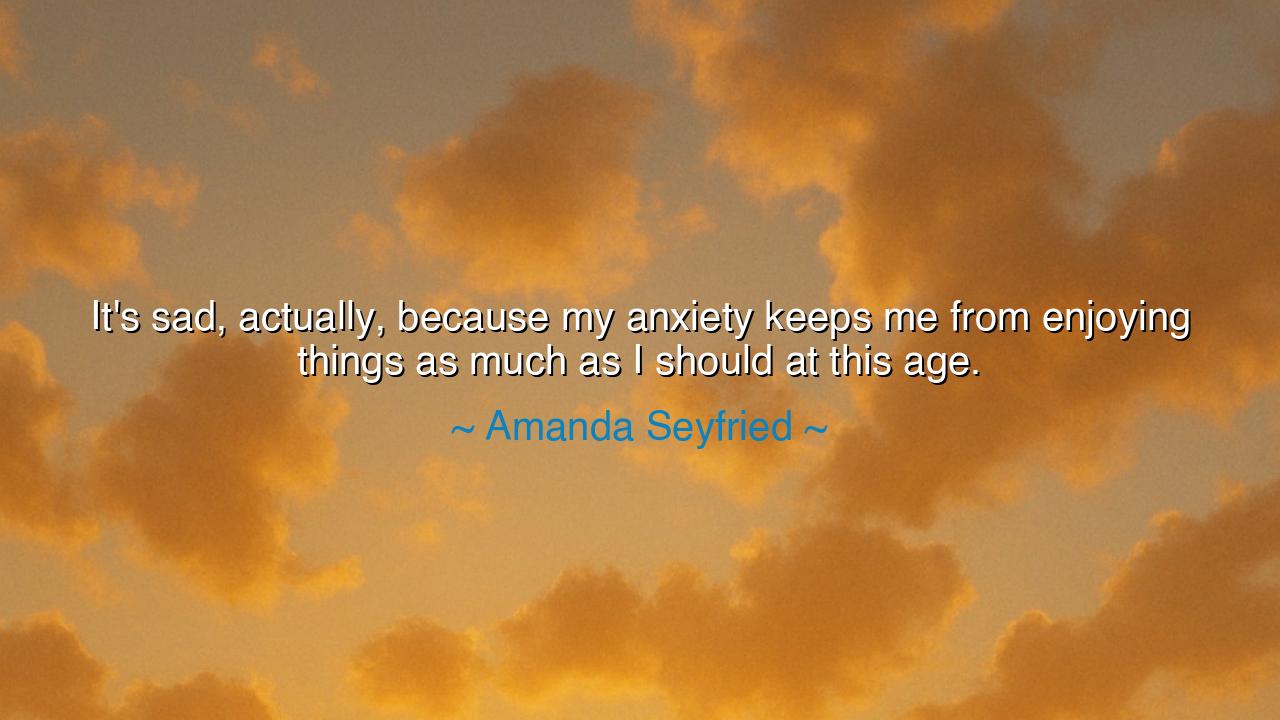
It's sad, actually, because my anxiety keeps me from enjoying
It's sad, actually, because my anxiety keeps me from enjoying things as much as I should at this age.






“It’s sad, actually, because my anxiety keeps me from enjoying things as much as I should at this age.”
Thus spoke Amanda Seyfried, a voice both tender and courageous, known for her grace upon the stage and screen, yet even more so for her honesty about the unseen struggles within the soul. Her words, quiet and sincere, unveil a truth that transcends her own life—the shadow of anxiety that follows even those who seem to have everything. Beneath her beauty and success lies the same fragility that dwells in all human hearts: the longing to live freely, to feel joy without fear’s restraint. Seyfried’s confession is not one of weakness, but of clarity; she gives voice to the silent war that many fight alone.
In the modern age, where light shines brighter and faster than ever before, the heart often finds itself overwhelmed. Anxiety, that ancient companion of humankind, has woven itself into the fabric of daily life, whispering fears where there should be peace. For the anxious soul, even beauty can become burdensome. The sunrise that should inspire awe may instead awaken dread; the laughter of friends can echo hollow in the ears of the troubled mind. Seyfried’s lament—that anxiety steals from her the joy she “should” feel—reveals this paradox: that one may be surrounded by blessings yet unable to touch them fully, as though a pane of glass separates life from the heart.
The ancients, too, knew this torment. The philosopher Seneca, writing to his friend Lucilius, spoke often of those who “suffer more in imagination than in reality.” He saw how the mind, untamed, can create storms where none exist. Anxiety, in this sense, is not a flaw of the weak, but a mark of the sensitive and self-aware—those whose souls are too finely tuned to the tremors of the world. Yet even Seneca, with all his stoic discipline, confessed that reason alone cannot always silence the trembling within. The human heart is both fragile and fierce, and the task of life is to learn not to destroy its sensitivity, but to guide it toward balance.
To understand Seyfried’s words is to understand that sadness does not only arise from loss, but also from the distance between what is and what should be. She speaks as one who yearns to enjoy life’s simple pleasures—to laugh without the weight of expectation, to stand in sunlight without the shadow of fear. But anxiety builds invisible walls, imprisoning the spirit in a cage made of thought. This is the tragedy of the anxious heart: to know beauty exists, to feel its warmth, yet to remain unable to rest within it. And yet, this very awareness—the pain of knowing what joy should feel like—is also the seed of healing. For one cannot fight what one does not see.
Consider the story of Abraham Lincoln, who, even as he led his nation through its darkest days, suffered from what was once called “melancholy.” He was haunted by his own thoughts, often unable to take comfort in his victories or find rest in peace. Yet from this suffering came his compassion, his patience, his depth of understanding. In his pain, he discovered the human condition in its fullest form. So too might we learn that anxiety, while it may steal some joy, can also deepen our empathy. It reminds us of the delicate threads that connect all hearts, and how precious peace truly is.
Still, we must not surrender to it. Anxiety may visit, but it must not reign. The task of life, as Seyfried’s words remind us, is not to banish fear completely, but to reclaim what it tries to take. This requires patience, courage, and kindness—toward oneself most of all. Meditation, breath, art, and the grounding of daily ritual are the tools by which one can begin to calm the inner tempest. Above all, it requires community: the reaching out of one trembling hand to another, saying, “You are not alone.” For in shared struggle, the burden becomes lighter.
So, my children of the restless age, learn this wisdom: do not curse your anxiety, for it is the echo of a mind that feels too deeply. But neither let it rob you of life. When fear rises, greet it as you would a storm—acknowledge it, endure it, and wait for the sky to clear. Seek joy not in the absence of pain, but in the small, defiant acts of living: in laughter, in kindness, in courage to begin again. For as Amanda Seyfried teaches, the tragedy is not that we feel too much, but that we forget how to live amidst those feelings.
Practical teaching: When your heart trembles, slow your breath. Anchor yourself in the present—touch the earth, feel the air, remember that you are alive. Do not measure joy by perfection; measure it by moments. Speak your fears aloud, and let them lose their power in the light of truth. For in naming your anxiety, you reclaim your soul from its grasp. And one day, perhaps, you will find that peace was never beyond your reach—it was waiting quietly, beneath the noise, for you to choose life over fear.






AAdministratorAdministrator
Welcome, honored guests. Please leave a comment, we will respond soon